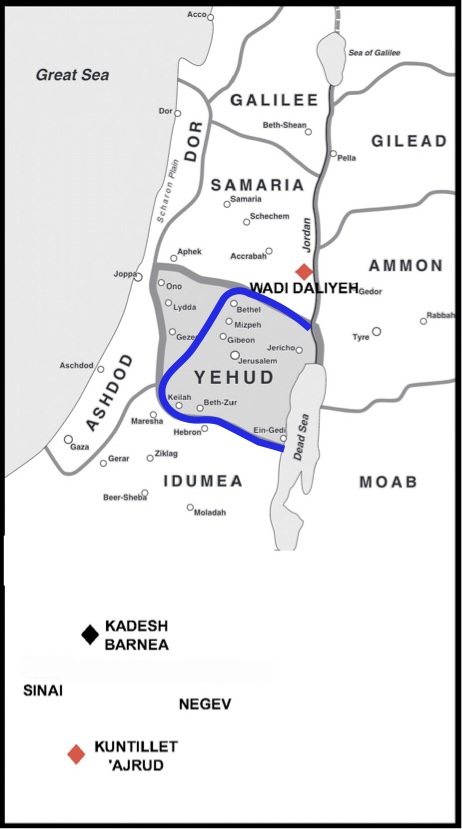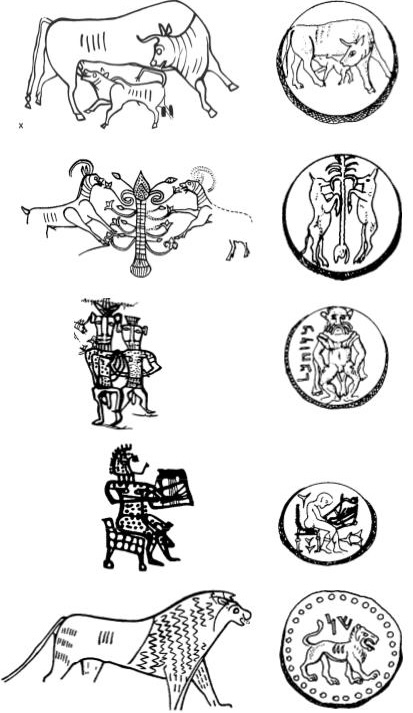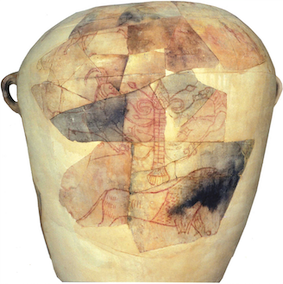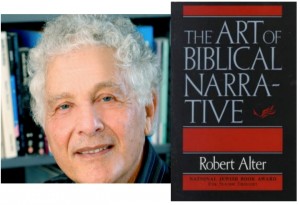Recent posts have focussed on the case for the earliest books of the Bible being composed as late as the Hellenistic era, that is less than 300 years before Christ. The longstanding conventional wisdom has understood the first biblical narratives go back to the time of King David (around 1000 BCE) or at least to the time of the Babylonian captivity (circa 600 BCE) and that much editing of these earlier works and creation of some new ones all took place under the benign rule of the Persians (late 500s through to 330 BCE).
The very idea of the Pentateuch (first five books of the Old Testament covering creation, the patriarchs, the exodus, the giving of law) and later books depicting the conquest of Canaan, the united kingdom of David and Solomon not having at least some roots in the historical past (however much real events may have been mythologized) of the “Near East” is very hard to accept for many of us. A long held assumption has been that the thought of the Near East is in many ways so opposed to Greek or Hellenistic thought and intellectual and ethical culture that it is inconceivable to imagine the early books of the Old Testament being products of Hellenistic times and culture. Recent posts here have attempted to demonstrate that such conventional assumptions need to be questioned. New scholarship has been drawing attention to a symbiosis between Hellenism and Near Eastern cultures and I will be addressing more of that work in future posts.
Meanwhile, it is surely necessary to understand as much as possible about the various settings and cultures that are being proposed as the birthplace of the Bible. In this post I am continuing to write up what I have been learning about Persian era Samaria and Judah (known as the Persian province Yehud). Do we find in either of these places the conditions that make the production of the biblical works likely?
The beginning of Persian era Palestine
The northern kingdom of Israel fell to the Assyrians in 722 BCE and the southern kingdom appears to have come to its end at the hands of the Babylonians in 586 BCE. The long term results of the respective conquests were very different from each other. Let’s compare how each region fared in the wake of their respective conquests.

Samaria from Assyrian conquest into the Persian period
In the north, the city of Samaria was made the provincial capital of the new Assyrian province. The entire region of Samaria did suffer significant population decline in the wake of Assyrian deportations of much of the population but the archaeological evidence also informs us that there was significant continuity of settlement. Assyrian destruction was not all encompassing. Large areas remained untouched, perhaps the result of surrendering rather than attempting resistance. New ethnic groups were brought in by the Assyrians but these coexisted with indigenous populations. There was no population replacement. After the Assyrian conquest much of (northern) Samaria continued to increase in population and prosperity (Knoppers 2004). Major recovery for southern Samaria had to await the Hellenistic era (Knoppers 2006).
This growth continued into the Persian period. Newly built major and minor roads no doubt facilitated this expansion:
The Achaemenid [= Persian] Period witnesses an unprecedented number of sites in the northern region, suggesting that this was a time of considerable demographic expansion. . . . Almost all of these Iron Age [= kingdom of Israel before 722 BCE] rural sites exhibit continuity into the Persian Period . . . . The western area of Samaria was intensively settled during the Achaemenid era. (Knoppers 2006: 268)
The city of Samaria itself was in the forefront of this expansion:
In Samaria, unlike in Jerusalem, one finds a fundamental continuity of settlement from the beginning of the Iron III period to the Achaemenid era. . . .
The areas around the town of Samaria were thickly settled during the Achaemenid era. . . .
The city of Samaria prospered and grew during much of the Persian era. . . . Stern (2001: 424) thinks, in fact, that Samaria was one of the most important urban areas in all of Palestine during the Achaemenid era. (Knoppers 2006: 270f)
The city’s population and material growth peaked in the Persian period with descendants of deportees from Assyrian times returning:
Surveys indicate that about half of the Iron II Israelite settlements in Manasseh, including the city of Samaria, continued to exist into the Persian period . . . ; in the Persian Period the area around Samaria was more densely populated than at any other time in history . . .
It also appears that deported Israelites or their descendants later returned to their homeland in significant numbers (Barmash 2005: 229-231). (Leith 273f)
Judah/Yehud from Babylonian conquest into the Persian period
The destruction of Judah by the Babylonians was punitive and “fateful” — in unmistakable contrast with how Samaria fared at the hands of the Assyrians.
The immediate results of the Babylonian conquest of Judah are clear. Much of the country, especially in the west, south, and east and in the immediate environs of Jerusalem, was destroyed by the foreign invaders. Archaeological excavations at many Judean sites show evidence of destruction that scholars have related to Nebuchadrezzar’s campaigns. Evidence for destruction extends from Tell ed-Duweir (Lachish) in the west, to Arad and environs in the south, to En-gedi and Jericho in the east. This is not to suggest, however, that every Judean city was left in ruins. Primarily those cities that served as fortress towns and where anti-Babylonian sentiment was high would have been the most likely targets for the Babylonians. One area, however, is the exception to the rule. Cities north of Jerusalem, in the traditional territory of Benjamin, suffered little or no destruction. . . .
The destruction of most Judean cities meant a disruption in the governmental apparatus as well as in the industry and economics of the country. Because soldiers profited from the spoils of war, plundering was the conqueror’s privilege and the conquered’s fate. Thus one must assume that much of the people’s possessions became Babylonian spoils of war. Many cities, like Jerusalem, that had once been thriving centers were left as depleted, subsistence-level villages if occupied at all. The primary economy of the country was probably reduced to a purely agricultural base.
A significant percentage of the manpower and leadership was killed off. There is no way to estimate the number of casualties who died at the hands of Babylonian troops, but it certainly would have been a sizable portion of the population, even though the Babylonians had no reputation for needless destruction and excessive killing. Nebuchadrezzar had taken a lenient attitude toward the country in 597, but no ancient ruler was very hospitable to a rebellious subject on the second military visit. (Miller and Hayes 479f)
Persian rulers did not improve the situation for Yehud (the name of the Persian province for the erstwhile kingdom of Judah):
The Jerusalem of the Achaemenid era has been described as a village with an administrative center. (Knoppers 2006:272)
Yehud was essentially irrelevant to the major interests of Persia:
One has to face the reduced extent of Yehûd against the background of the broader development in the Southern Levant in the 5th/4th century BCE. The marginal international importance is likewise true for the Persian period, when Yehûd achieved the status of a Persian province (at the latest) in the mid-5th century. . . . At least until the upheavals in Egypt and the loss of the control of Egypt by the Persian authority, the province of Yehûd was politically and economically more or less irrelevant. (Fravel and Psychny 4)
Transition to the Persian period is often unclear
With reference to the archaeological remains. . . .
. . . we are still largely unable to distinguish clearly between material remains of Iron Age III (the period of Babylonian overlordship) and those of the early Persian period (in turn, this might indicate a very smooth transition from one to the other, with Persian administration remaining in fact ‘Babylonian’ for quite some time). (Uehlinger 136)
Most histories of this period focus on Palestine’s relations with Persia and to some extent Greece as the rival power to Persia. The economic impact and cultural influence of Phoenician cities is also recognized. Yet there was evidently a strong Egyptian influence in the area given the number of scarab amulets, Egyptian-style bronze statuettes and Egyptian deity representations on coins in Palestine during this same period.
In this respect, the impact of Egypt on Palestine during the 5th and particularly the 4th century . . . is too often disregarded in historical treatments of the period. (Uehlinger 136)
Evidence of Persian interest (or lack of it) in Samaria and Yehud
Images on seals and coins functioned as imperial propaganda to remind subject populations of Persian power. By comparing the locations of these finds and the particular styles of iconography archaeologists are informed about the areas of main interest to the Persians. Persian royalty appears to have little interest in stridently imposing its presence in Palestine until very late in the Persian period.
The bulk of seals and sealings discussed belongs to the second half or even last third of the Persian period, which makes the potential for Persian impact in the late 6th and earlier 5th centuries BCE even slimmer. . . .
In great contrast to other imperial administrations that had ruled in Palestine during earlier periods (Middle and New Kingdom Egypt and to some extent Assyria), the Achaemenid imperial administration apparently did not interfere in any way in the local seal production, certainly not in the engravers’ choices regarding the composition of their figurative repertoire.
Two main reasons may explain this contrast: basically, Persian interest and involvement must have been much more intense in Asia Minor than in far-off Palestine which was ‘Third World’ to the Achaemenids not worthy for investment. . . . To the extent that the physical presence of people of Persian origin was probably limited to military officers and administrators, Persian culture remained a largely foreign element in Palestine. Granted that we interpreted the incomplete evidence correctly, we could even observe a certain reluctance or reservation on behalf of Phoenician seal engravers to adopt Persian Achaemenid (even royal) figurative models, an attitude which is in strong contrast to the same craftsmen^ openness to integrate schemes from Egypt, Cyprus or Greece. (Uehlinger 171f)
Most of the seals and coins promoting Persian power that do appear come from Samaria, not Yehud.
Achaemenid iconography and other ‘Persianisms’ figure much more prominently on coins from Samaria than from anywhere else in the country. . . . It is striking that except for one item from Jericho, Yehud is not represented at all in our survey on iconographical Persianisms. (Uehlinger 173)
There is little evidence that the Persian administration was interested in interfering with local religious practices as a rule. The indication for this is the absence of specifically Persian religious or cult images on coins and seals.
We may notice in passing the total lack of specifically ‘religious’ subject matter other than ‘heroic combat’ or ‘encounter’, such as cult (worship or offering) scenes, representations of deities, divine symbols or the like, which contrasts neatly with Egyptian, Assyrian and Babylonian glyptic and their respective influence on Palestinian glyptic in earlier periods. This observation confirms the commonly accepted opinion that the Persian administration generally did not interfere with the religious beliefs of their subjects, certainly not by imposing nor even publicizing the worship of Persian deities, but rather aimed at favouring cultic normality in pacified provinces . . . . The one common notion which is emphatically stressed by a great proportion of seals and sealings is the heroic character of Persian kingship. (Uehlinger 175)
When we come to the fourth century BCE (note Persian rule over Palestine commenced in the late sixth century BCE) it is Samaria, the northern province, that is the leading representative of imperial power.
Yehud coinage, generally of rather poor minting quality, shows very few ‘Persianisms’, but also no particular dependency on Phoenician models. . . . In contrast, Samarian coinage is literally full of ‘Persianisms’, surpassing by far any other mint of the region in this respect. This confirms and emphasizes our conclusion based on the glyptic evidence, namely that Persian iconographical models and Achaemenid royal ideology had a particularly strong impact on 4th-century Samaria. (Uehlinger 177f)
Was this because Samarians were inherently more loyal to Persia? Or might the explanation be somewhat more complex?
Obviously these depictions are not all an expression of Samarian loyalty to the Achaemenid king and to the Persian imperial administration. One should rather suspect that the unusual emphasis betrays propaganda which may have intended to cover particular tensions in real life. The many ‘portraits’ of Persian officers point to a strong Persian military presence at Samaria. Many of these issues must have been minted by order of Persian officials stationed in the province, or of some higher authority such as Mazday the satrap. . . .
In sum, one cannot ignore that more than any other repertoire of the area, the coins of Samaria emphatically claim strong allegiance of the province to the Great King and his representatives. (Uehlinger 178f)
Comparing Samaria and Yehud culture and religion
If the archaeological evidence indeed supports such disparity between Samaria and Judah, there is no comparison, only contrast, between Samaria and Yehud (the name of the Persian province) in the Persian era. Yehud became a backwater under Persian rule.
The two regions shared a common language and scripts.
The language of the [Samaria] papyri is a conservative version of Official Aramaic. The language used is virtually identical to the language employed in the fifth-century Elephantine papyri . . . .
The hundreds of short inscriptions found in Samaria dating to the late Persian and Hellenistic Periods suggest that the Samarians wrote and spoke the same language as the Judeans did during this time. Aramaic evidently was employed, as it was in other provinces in western Asia, as the language of governance and international diplomacy. Hebrew was employed, but not restricted to, certain official or sacred purposes. The scribes of both communities employed a similar system of scripts, an Aramaic script for diplomatic and commercial activities and a Hebrew script (the so-called palaeo-Hebrew) for certain religious purposes . . . Both the Judeans and the Samarians used the two scripts as late as the Hellenistic era. (Knoppers, 273f)
The names of persons between the two provinces are similar, both pointing to a religious affiliation with Yahweh worship.
The linguistic and religious features of onomastica can be used to provide some indication of their bearers’ religious identities. One may begin by observing the large number of proper names shared with Judah. . . .
In addition to the Yahwistic nomenclature found within the Samaria papyri, Yahwistic names have also been found on the legends of fourth-century Samarian coins. (Knoppers 2006: 275f)
There are also non-Yahwistic names, names with links to other deities, though some scholars would prefer to date these to the early Hellenistic era. Even so, one notes that they are Samarian and not from Yehud.
In contrast with the Samarian coins bearing Yahwistic appellatives, there are a few Samarian coins featuring non-Yahwistic theophorics. One Samarian coin type with the divine name ‘Zeus’ (ΙΕΥΣ) is attested, along with an image of this deity . . . On the reverse of this coin is the name ׳Jeho’anah’ (yhw’nh). On yet another coin one finds the face and short form of the name of the god ‘[Hera]cles’. . . . The appearance of these Greek deities may indicate a stronger western cultural influence in Samaria than in contemporary Yehud . . . . (Knoppers 2006: 277)
But the Yahwistic names are far more numerous:
Neither did Samaria post 722 become a majority non-Yahwistic province; the names of Samarians mentioned in the fourth-century Samaria Papyri in the fourth century are overwhelmingly Yahwistic. (Leith 274)
As for the material evidence of religious developments in these two areas, there is nothing to indicate any difference from the pre-Assyrian and pre-Babylonian monarchic periods of Israel and Judah.
There was no “religious revolution” in Yehûd or in Samaria that can be drawn from the account of the material culture. Even if there was a ‘material otherness’ of the Yehûdite material culture, Judaism was not the outcome of a revolution and a deliberate distinctiveness. (Fravel and Psychny 19)
The message is that there was cultic or religious continuity from the time both regions were independent kingdoms through to the time they became separate Persian provinces.
What did that common and long standing religious life look like?
Yahweh worship in the Kingdom of Israel continues through the Persian era
In the above context one should take special note of the evidence for the continuity of religious practices of the people of the Kingdom of Israel through to the Persian province of Samaria. We had a glimpse of aspects of the Samarian cult in an earlier post so I won’t repeat what I posted there but supplement it a little.
Around 800 BCE an Israelite settlement (from the northern kingdom of Israel) of what appears to have been a group of Israelites sent by the king of Israel to establish within the southernmost borders of the kingdom of Judah. The site is known to us as Kuntillet Ajrud (meaning “the isolated hill of the water sources”). The Kingdom of Judah had earlier established a fortress at Kadesh Barnea but this had been abandoned at the time of the Kuntillet Ajrud settlement.
Evidently, the founders of Ajrud did not want to occupy the fortress because of its Judean identity. They preferred to found a new site, in a less comfortable location with a meagre water source, 15 km off the main road, rather than settle in a place associated with a Judean tradition. (Meshel 67)
How do we know it was a distinctively (northern) Israelite site and not a (southern) Judahite one? Some of the clues:
- Inscriptions at the site specifically document “YHWH of Samaria”
- the site’s personal names use the Samarian “yw” as opposed to the Judean “yaho” to refer to YHWH
- the pottery is Samarian style
- the script is Phoenician (as used in Israel)
The site was short-lived, being abandoned by around 750 BCE.
The artwork at Kuntillet Ajrud is clearly related to the images on Samarian coins and therefore throws more light on Samarian religion of the Persian era. The images in the left column are from eighth century Kuntillet Ajrud and their comparable Samarian Persian coin images on the right.

2. Ibexes [goats] flanking blossoming tree (see below);
3. Bes, Egypto-Phoenician dwarf deity of life and prosperity;
4. Harpist on chair; Samarian coin of nude harpist with Egyptian goddess Hathor’s headdress in front;
5. Lion – frequent image in Israelite coins; an image of Yahweh? or a goddess “mistress of lions”? (Images and notes from Leith)
This motif was a common one throughout the ancient Near East for centuries, but is not a known coin motif anywhere except fourth-century Samaria. The uniqueness of the coin image and the inscribed letters Š-M-R (abbreviation for ‘Samaria’) on the coin reverse suggest this particular coin was specifically designed to communicate Samarian identity. . . . The goat and tree motif is plausibly linked with the goddess Asherah. (Leith 276)
Here is a photo of the original image:
For clarity, here is a sketched outline of that tree:

And here is a copy of Russell Gmirkin’s recent comment:
A key aspect of the Iron II cult of Asherah was a pole or rod. A contemporary representation of this rod appears at Kuntillet ‘Ajrud, where a picture of a stylized sacred tree flanked by ibexes appears on Pithos A where it is thought to represent Asherah as a fertility goddess (Leith 2014: 276; Asherah is associated with flocks of sheep or goats at Deut. 7:13; 28:4, 18, 51). This sacred tree corresponds in great detail to the blooming rod of Aaron, the symbol of his priesthood, with its buds, blossoms and almonds (Num. 17:8), which was laid up in the sacred ark in the tabernacle (Num. 17:10; cf. Heb. 9:4).
“It is difficult to imagine a more precise pictorial representation of the object described verbally in the Pentateuchal account than this drawing. The central element of the drawing plainly resembles a staff. It is adorned with six buds alternating with eight blossoms. And at the top are two elements shaped like almonds in the shell and speckled with dots that match the pockmarks typical of these shells.” (Eichler 2019: 36.)
It would appear that the Priestly author, perhaps along with Ezekiel, did not find the Asherah objectionable, and included this flowering staff among the most precious contents preserved in the sacred ark (Eichler 2019: 40-41). This sacred staff later featured in the account of Moses striking the rock to obtain water in Num. 20:1-13 (Eichler 2019: 41-45). The sacred tree flanked by rampant goats is an image that also uniquely recurs in fourth-century BCE Samarian coinage, along with other imagery also depicted at Kuntillet ‘Ajrud (Leith 2014). This seems to indicate the persistence of the Asherah as revered sacred tree at a late date in Samaria.
It would appear that if we are looking at a Hellenistic provenance for the Hebrew Bible, the biblical tropes themselves go back much earlier.
Eichler, Raanan. “The Priestly Asherah.” Vetus Testamentum 69, no. 1 (January 21, 2019): 33–45.
Frevel, Christian, and Katharina Pyschny. “A ‘Religious Revolution’ in Yehûd? The Material Culture of the Persian Period as a Test Case: Introduction.” In A “Religious Revolution” in Yehûd?: The Material Culture of the Persian Period as a Test Case, edited by Christian Frevel, Katharina Pyschny, and Izak Cornelius, 1–22. Fribourg: Academic Press, 2014.
Knoppers, Gary. “In Search of Postexilic Israel: Samaria After the Fall of the Northern Kingdom.” In In Search of Pre-Exilic Israel: Proceedings of the Oxford Old Testament Seminar, edited by J. Day, 150–80. JSOTSup 406. London: T. & T. Clark Continuum, 2004.
Knoppers, Gary N. “Revisiting the Samarian Question in the Persian Period.” In Judah and the Judeans in the Persian Period, edited by Oded Lipschits and Manfred Oeming, 265–90. Winona Lake, Ind: Eisenbrauns, 2006.
Leith, Mary Joan Winn. “Religious Continuity in Israel/Samaria: Numismatic Evidence.” In A “Religious Revolution” in Yehûd?: The Material Culture of the Persian Period as a Test Case, edited by Christian Frevel, Katharina Pyschny, and Izak Cornelius, 267–304. Fribourg: Academic Press, 2014.
Meshel, Zeev, Shmuel Aḥituv, and Liora Freud. Kuntillet ʻAjrud (Ḥorvat Teman): An Iron Age II Religious Site on the Judah-Sinai Border. Jerusalem: Israel Exploration Society, 2012.
Miller, J. Maxwell, and John H. Hayes. A History of Ancient Israel and Judah. 2nd edition. Louisville, Ky. London: Westminster John Knox Press, 2006.
Uehlinger, Christoph. “‘Powerful Persianisms’ in Glyptic Iconography of Persian Period Palestine.” In The Crisis of Israelite Religion: Transformation of Religious Tradition in Exilic and Post-Exilic Times, edited by Bob Becking and Marjo C. A. Korpel, 134–82. Brill, 1999.


